
FUTURE FORCES FORUM 2024: Defense Technologies And Lessons From Ukraine
More than fifty Ukrainians from law enforcement, government, industry, and civil society shared their experiences not through textbooks or media reports, but from the stage of the 15th annual FUTURE FORCES FORUM 2024. This event took place in mid-October at the PVA EXPO PRAHA in the Czech Republic's capital.
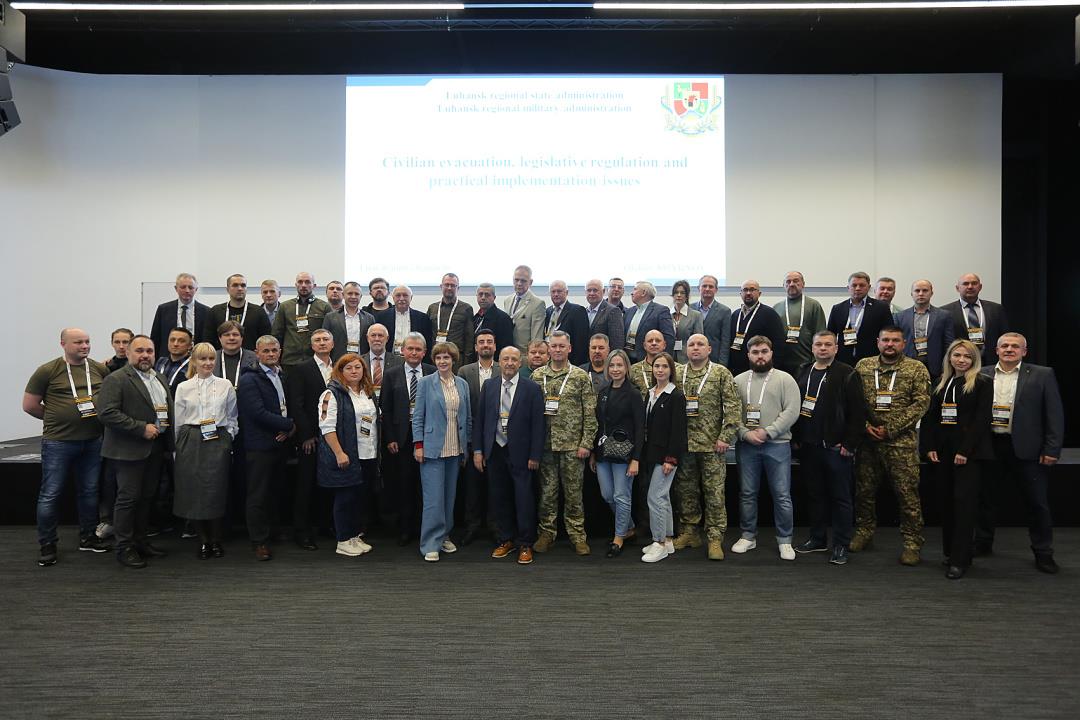
Family photo of the Ukrainian delegation and representatives of the European Commission
The overall focus of this forum, as in past years, centered on issues of international security, partnership cooperation, and the restoration of critical infrastructure. This international event, which attracted security and defense industry producers and users from over 60 countries, was held in Prague under the patronage of Czech President Petr Pavel and the Czech government. However, one of the primary focal points this year was Ukraine.
"I have never questioned the necessity of supporting Ukraine's territorial integrity. Victory in the war with Russia cannot be achieved if half of Ukraine's population perishes. Therefore, one of the top priorities is to ensure the safety of the civilians," emphasized Petr Pavel in his address to forum participants.
Thanks to the initiative and efforts of the Ukrainian Defense and Security Industry Association (UDSIA), a large, multi-agency official delegation from Ukraine was able to attend this international forum for the first time. The delegation included a team of officers from the State Border Guard Service led by General Leonid Baran, representatives from the National Guard, State Emergency Service, and municipal leaders from Kyiv, Kharkiv, and the Cherkasy Oblast Council, as well as officials from the Donetsk and Luhansk Regional Military Administrations, alongside leading national experts in energy, military programs, and civil defense. At the forum, Ukrainian manufacturers displayed their latest innovations, which have proven effective both on the battlefield and in safeguarding critical infrastructure.
"The Ukrainian people are grateful to all democratic nations and the European community for the support they provide us. The hard-earned experience of survival in this ongoing, bloody war has cost us tens of thousands of Ukrainian lives. We hope our friends can use this knowledge, should they face similar threats, to minimize civilian casualties and ensure the rapid restoration of damaged infrastructure and essential services," emphasized Forum co-organizer and Head of the Ukrainian Defense and Security Industry Association (UDSIA), Yevhen Krupa.
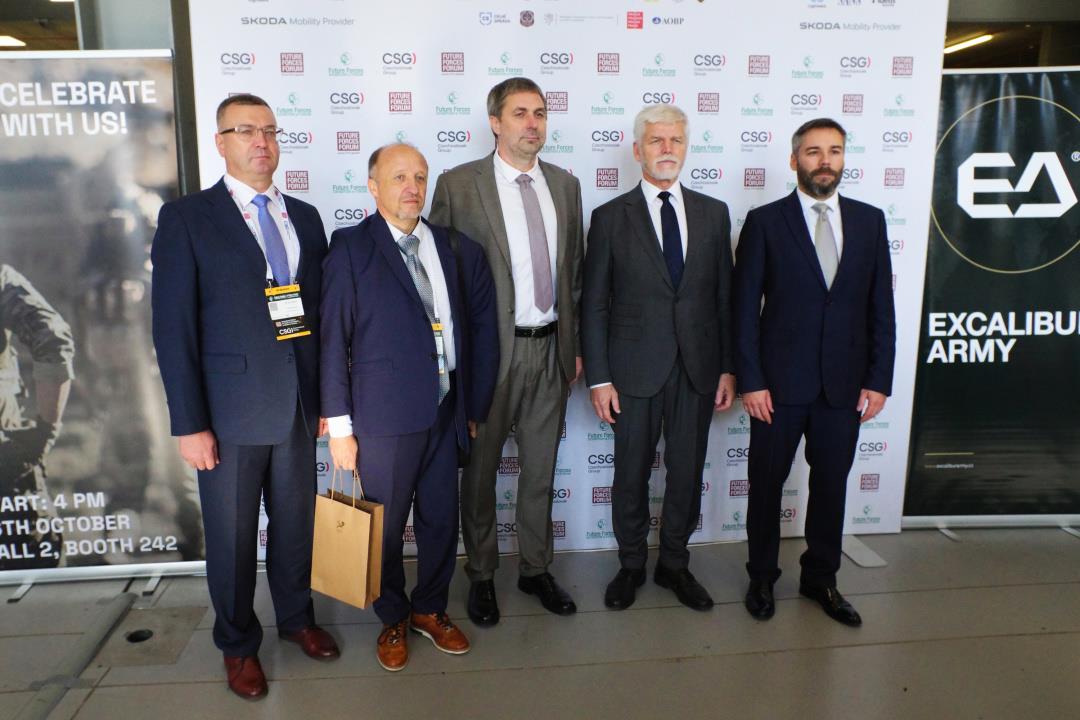
From left to right: Chairman of the Uman District Council Vitalii Oliinyk, Head of the Ukrainian Defense and Security Industry Association Yevhen Krupa, Managing Director of the Future Forces Forum Koci, Czech President Petr Pavel, Executive Director of the Future Forces Forum Adam Drnek
Ukrinform had the opportunity to explore open exhibitions, get hands-on with the "hardware," speak with experts, and participate in live demonstrations and candid discussions. The delegation witnessed firsthand the display of Ukrainian technologies aimed at enemy elimination and civilian protection.
It is worth noting that the official opening of the FUTURE FORCES FORUM 2024 was preceded by extensive negotiations and preparation. The presidential endorsement underscored a profound awareness of the present and future impacts of Russia's unprecedented acts of aggression and destruction for both Europe and Ukraine.
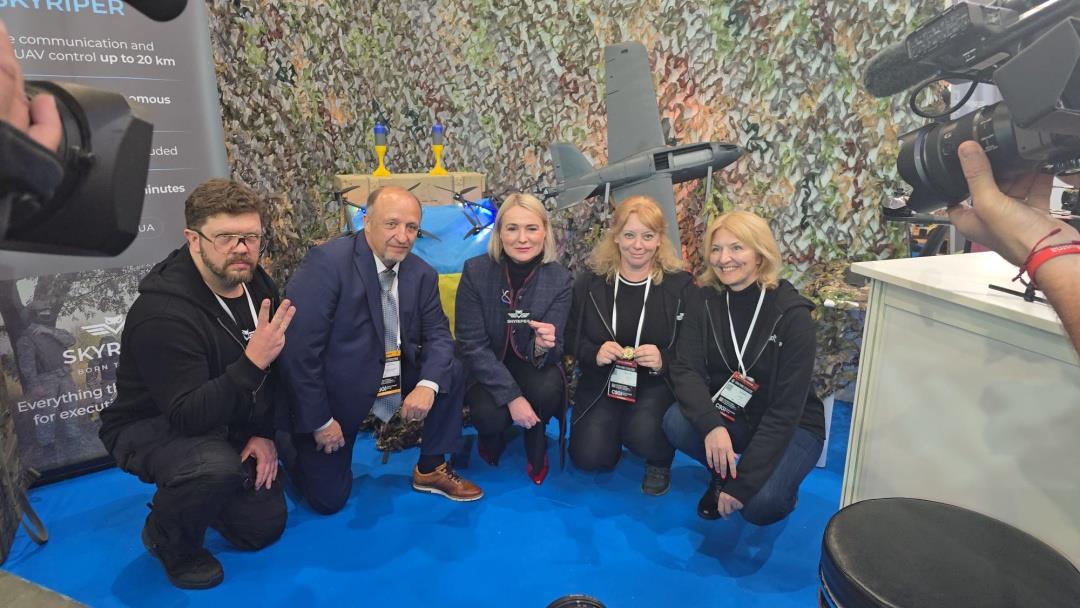
Czech Defense Minister Jana Černochová at the Ukrainian stand of Skyriper drone manufacturers (center)
Czech Defense Minister Jana Černochová supported the Ukrainian delegation's initiative, advocating for the continuation of sharing insights on civilian protection and survival strategies under armed aggression within the "Civil Security and Cooperation" conference.
"We are keen to receive firsthand information from those directly involved in these crises, and I am confident that our Ukrainian colleagues' initiative will be widely embraced by EU representatives," said Jana Černochová.
At the FUTURE FORCES FORUM 2024, several pavilions showcased modernized weaponry and military equipment designed with consideration of Ukraine's recent combat experience. Manufacturers focused primarily on enhanced armor and improved battlefield situational awareness to help crews navigate effectively. Many new models are designed to address both hybrid and conventional warfare dynamics observed in eastern Ukraine. Anti-drone technologies, such as systems that jam control and data channels, were prominently displayed, alongside lightweight armored vehicles, MRAPs adapted for urban warfare, and other innovations.
A key trend is the extensive integration of active protection systems (for intercepting guided and conventional projectiles) and reactive armor (to counter cumulative and other types of rounds) on armored vehicles. Remote systems for demining and logistics, as well as specialized optical systems that alert troops about threats and provide friendly force locations, were also highlighted.
The forum in Prague featured advanced cryptographic tools to secure military communications, a variety of small arms, robotics, mobile modular field hospitals, inflatable decoy tanks and air defense platforms, precision munitions, as well as specialized gear and equipment.
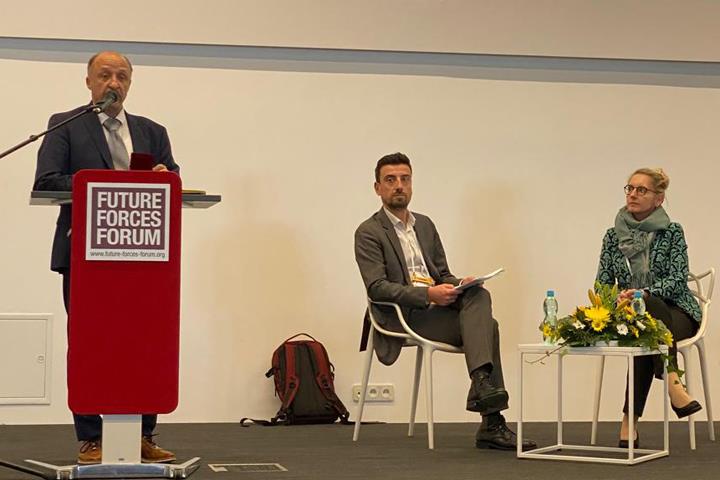
Chairman of the Board of the Ukrainian Defense and Security Industry Association Yevhen Krupa, Deputy Head of the European Commission's Directorate-General for Civil Protection and Humanitarian Aid (ECHO) Alessandro Valdambrini, Head of the European Commission Representation in the Czech Republic Monika Ladmanova
Each day of the forum began with panel discussions and visits to Ukrainian exhibits, where participants sought partnerships not only in weapon production and military personnel protection but also in civilian defense. In this context, an international working group under the patronage of the FUTURE FORCES FORUM (FFF), in collaboration with the Ukrainian Defense and Security Industry Association (UADSI) and the Czech Republic's Association of the Defense and Security Industry (AOBP), aligned with the "Future of Civil Security" (FCS) conference concept. This initiative addresses both military and civilian security, drawing from the experiences and lessons of the conflict in Ukraine.
A prominent figure in facilitating international contacts and negotiations was Tomáš Kopečný, a great friend of Ukraine and the Czech Republic's governmental representative for Ukraine's reconstruction.
The FCS conference established a specialized platform for interaction and information exchange, focusing on lessons learned not only from active conflict zones to strengthen defense and internal security in NATO and collaborate countries but also on providing Ukraine with essential support, including equipment and services to ensure civilian safety and infrastructure protection, as well as the reconstruction of war-affected regions.
Forum panel discussions also addressed improving and optimizing collaboration among military, security, and civilian institutions - such as government, regional, municipal, and local authorities - during crises to safeguard infrastructure and ensure the rapid recovery and functionality of civilian areas. The forum attracted significant attention from European officials, including Alessandro Valdambrini, Deputy Head of the European Commission's Directorate-General for Civil Protection and Humanitarian Aid (ECHO), who actively participated in the exchanges in Prague.
In a statement to Ukrinform, Valdambrini discussed the available resources and support of European partners and international donors for Ukraine's reconstruction. He noted candidly that while ECHO A2 (the Civil Protection and Humanitarian Aid Operations Directorate) does not have the mandate to fund infrastructure projects in Ukraine, it closely collaborates with various donors and international organizations - such as the World Health Organization (WHO), USAID, and the International Committee of the Red Cross - as well as governments from regions including the Middle East and Asia-Pacific. This collaboration promises added value for future interactions with Ukraine's central and local government representatives.
The Ukrainian experience in addressing challenges such as mass displacement across state borders during wartime, the involvement of internal troops in stabilizing de-occupied territories, the activities of the cyber police during the war, coordination of evacuation measures under martial law, the functioning of a frontline city of a million people - these challenges, realities, and wartime needs, as well as unique solutions in the field of energy security, critical infrastructure protection, maritime mine threats, and humanitarian demining - have provided valuable and insightful lessons for our international partners during panel discussions.
Ukraine's experience in warfare and defense against aggression underscores a growing divide between countries and companies that have embraced the benefits of the Fourth Industrial Revolution and those that have not. The war in Ukraine has only accelerated this process. It highlights the advantages of innovation over mere technical invention. While an invention is simply a technical solution, innovation goes beyond that - it is the ability to make a product or process commercially viable.
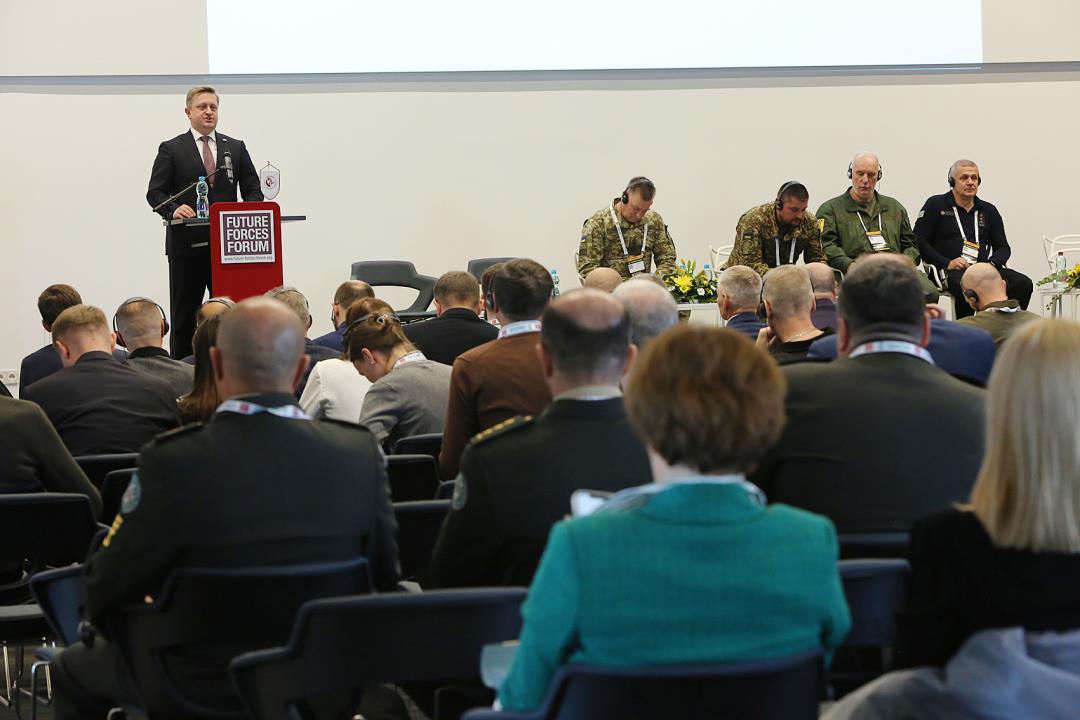
Speech by Ukraine's Ambassador to the Czech Republic Vasyl Zvarych
Presidium: Head of the Department of State Border Protection Leonid Baran, Colonel Viacheslav Melnyk - Head of the Special (Law Enforcement) Measures Unit of the Public Security Department of the Headquarters of the National Guard of Ukraine, Mykhailo Shcherbyna - Deputy Director of the Department of Municipal Security of the Executive Body of the Kyiv City Council (Kyiv City State Administration), Bohdan Danyliuk - Deputy Director of the Department - Head of the Department of Organization of Service and Fire and Rescue Works of the Department of Emergency Response Situation of the State Emergency Service of Ukraine
Today, all Russian, Iranian, and North Korean leaders, from czars and supreme leaders to modern-day dictators, believed and continue to believe that the response to modernization lies in technology. However, that is not the case. The answer lies not in technology itself but in the socio-economic environment, that fosters the development of technologies and their commercialization. Ukraine, Europe, and the West know well that the key to success lies in culture and the way of life of society. Key cultural elements that allow ideas to thrive and integrate into successful commercial enterprises include democratic governance, free markets where investors seek new technologies, intellectual property protection, control over corruption and crime, and a legal system where the accused have a chance to be acquitted and the guilty punished. This culture encourages critical thinking, allows independence, and accepts failure as a step toward trying again.
The milestone“FUTURE FORCES FORUM 2024” confirmed these fundamental truths. For the first time, it brought together weapon manufacturers and civil defense experts to search for effective industry solutions. The next forum is scheduled to take place in Warsaw or Helsinki, with organizers still deciding the location, but Prague is already preparing for its return in October 21-23, 2026.
Following the Forum, nearly all members of the Ukrainian interagency delegation supported the initiative of the Ukrainian Defense and Security Industry Association to share their experiences in civilian safety with European colleagues and signed a memorandum of cooperation in this area.
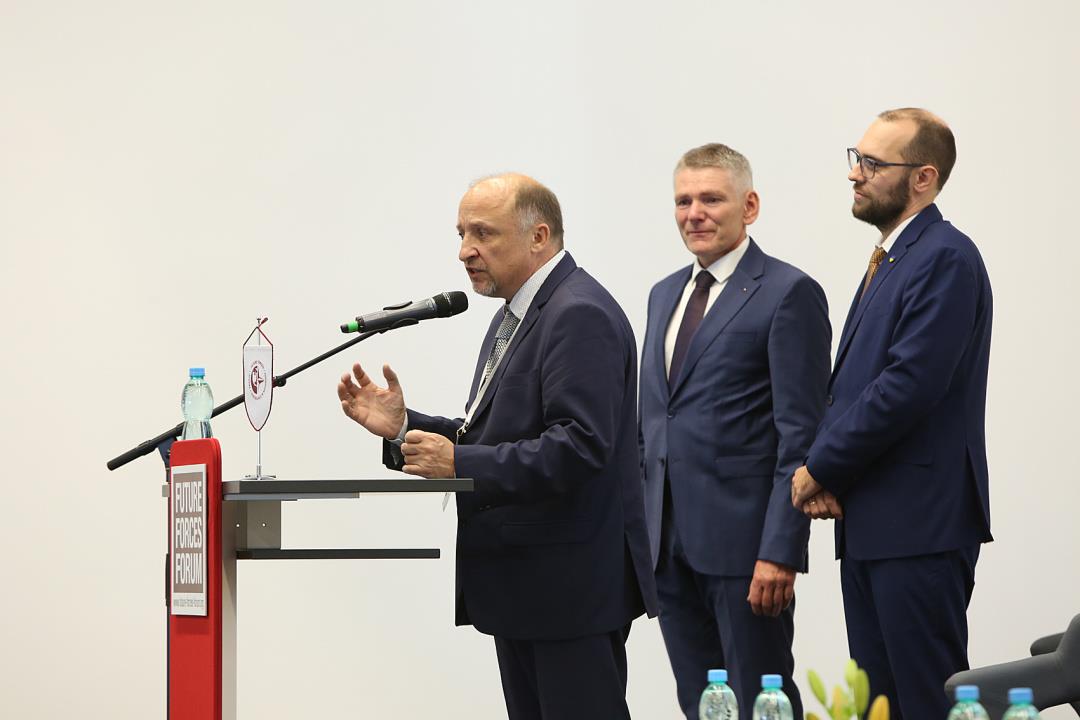
Head of the Ukrainian Defense and Security Industry Association
Yevhen Krupa, President of the Defense and Security Industry Association of the Czech Republic Jiří Hynek, Government Commissioner for Ukraine's Reconstruction in the Czech Republic
Tomáš Kopečný
The success of the event was made possible thanks to the fruitful collaboration and support of Alessandro Valdambrini, Deputy Head of the Civil Protection and Humanitarian Aid Directorate-General in Europe (ECHO), Monika Ladmanová, Head of the European Commission Representation in the Czech Republic, Tomáš Kopečný, Government Commissioner for Ukraine's Reconstruction in the Czech Republic, and General Radek Hasal, Head of the Military Chancellery of the President of the Czech Republic. The event organizers included Daniel Koči, Managing Director of the Future Forces Forum, Jiří Hynek, President of the Defense and Security Industry Association of the Czech Republic, and Yevhen Krupa, Chairman of the Board of the Ukrainian Defense and Security Industry Association.
Andriy Lysenko , Roman Sushchenko, special for Ukrinform
Legal Disclaimer:
MENAFN provides the
information “as is” without warranty of any kind. We do not accept
any responsibility or liability for the accuracy, content, images,
videos, licenses, completeness, legality, or reliability of the information
contained in this article. If you have any complaints or copyright
issues related to this article, kindly contact the provider above.

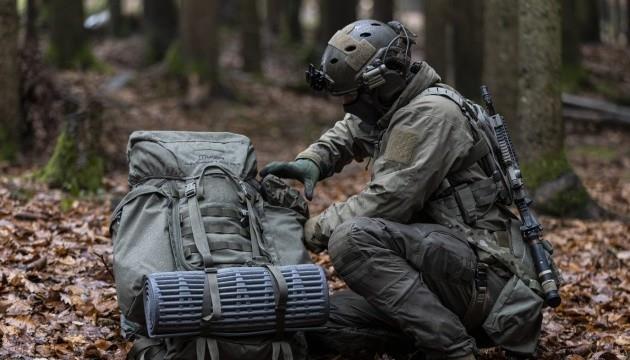
















Comments
No comment